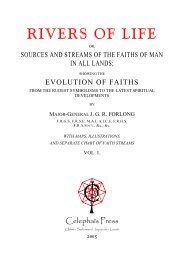Dutch Fairy Tales by William Elliot Griffis.pdf
Dutch Fairy Tales by William Elliot Griffis.pdf
Dutch Fairy Tales by William Elliot Griffis.pdf
Create successful ePaper yourself
Turn your PDF publications into a flip-book with our unique Google optimized e-Paper software.
<strong>Dutch</strong> <strong>Fairy</strong> <strong>Tales</strong> for Young Folks<br />
“Hear ye all and obey. Any one caught in helping a ship go <strong>by</strong> without paying toll, whether it be night, or<br />
whether it be day, shall have his thumbs cut off and be put in the dark dungeon for a month. Again I say,<br />
Obey!”<br />
With this, the giant swung and twirled his club aloft and then brought it down on a poor countryman's cart,<br />
smashing it into flinders. This was done to show his strength.<br />
So every day, when the ships hove in sight, they were hailed from the giant's castle and made to pay heavy<br />
toll. Poor or rich, they had to hand over their money. If any captain refused, he was brought ashore and made<br />
to kneel before a block and place one hand upon the other. Then the giant swung his axe and cut off both<br />
hands, and flung them into the river. If a ship master hesitated, because he had no money, he was cast into a<br />
dungeon, until his friends paid his ransom.<br />
Soon, on account of this, the city got a bad name. The captains from France kept in, and the ship men from<br />
Spain kept out. The merchants found their trade dwindling, and they grew poorer every day. So some of them<br />
slipped out of the city and tried to get the ships to sail in the night, and silently pass the giant's castle.<br />
But the giant's watchers, on the towers, were as wide awake as owls and greedy as hawks. They pounced on<br />
the ship captains, chopped off their hands and tossed them into the river. The townspeople, who were found<br />
on board, were thrown into the dungeons and had their thumbs cut off.<br />
So the prosperity of the city was destroyed, for the foreign merchants were afraid to send their ships into the<br />
giant's country. The reputation of the city grew worse. It was nicknamed <strong>by</strong> the Germans Hand Werpen, or<br />
Hand Throwing; while the <strong>Dutch</strong>men called it Antwerp, which meant the same thing. The Duke of Brabant, or<br />
Lord of the land, came to the big fellow's fortress and told him to stop. He even shook his fist under the giant's<br />
huge nose, and threatened to attack his castle and burn it. But Antigonus only snapped his fingers, and<br />
laughed at him. He made his castle still stronger and kept on hailing ships, throwing some of the crews into<br />
dungeons and cutting off the hands of the captains, until the fish in the river grew fat.<br />
Now there was a brave young fellow named Brabo, who lived in the province of Brabant. He was proud of his<br />
country and her flag of yellow, black and red, and was loyal to his lord. He studied the castle well and saw a<br />
window, where he could climb up into the giant's chamber.<br />
Going to the Duke, Brabo promised if his lord's soldiers would storm the gates of the giant's castle, that he<br />
would seek out and fight the ruffian. While they battered down the gates, he would climb the walls. “He's<br />
nothing but a 'bulle−wak'“ (a bully and a boaster), said Brabo, “and we ought to call him that, instead of<br />
Antigonus.”<br />
The Duke agreed. On a dark night, one thousand of his best men−at−arms were marched with their banners,<br />
but with no drums or trumpets, or anything that could make a noise and alarm the watchmen.<br />
Reaching a wood full of big trees near the castle, they waited till after midnight. All the dogs in the town and<br />
country, for five miles around, were seized and put into barns, so as not to bark and wake the giant up. They<br />
were given plenty to eat, so that they quickly fell asleep and were perfectly quiet.<br />
At the given signal, hundreds of men holding ship's masts, or tree trunks, marched against the gates. They<br />
punched and pounded and at last smashed the iron−bound timbers and rushed in. After overcoming the<br />
garrison, they lighted candles, and unlocking the dungeons, went down and set the poor half−starved captives<br />
free. Some of them pale, haggard and thin as hop poles, could hardly stand. About the same time, the barn<br />
doors where the dogs had been kept, were thrown open. In full cry, a regiment of the animals, from puppies to<br />
hounds, were at once out, barking, baying, and yelping, as if they knew what was going on and wanted to see<br />
BRABO AND THE GIANT 45






![[PDF] Prolegomena](https://img.yumpu.com/16774951/1/190x245/pdf-prolegomena.jpg?quality=85)









